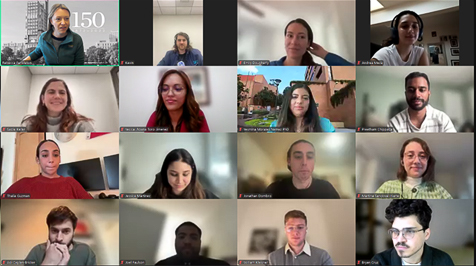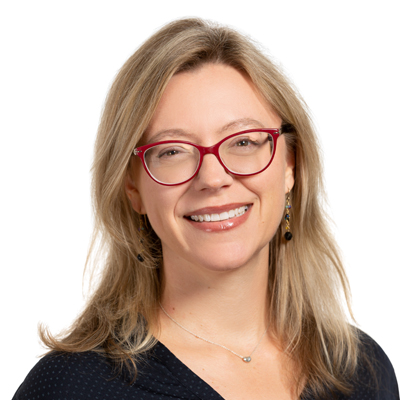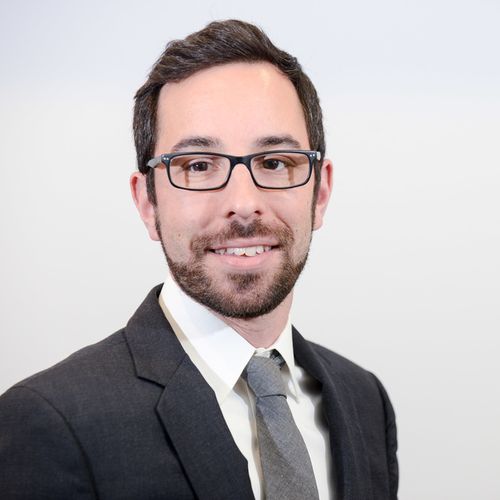Law Without Borders
BU Law students master Spanish for legal practice.

Students gathering over Zoom for the final class meeting of the Spanish for Lawyers course in fall 2024, courtesy of Rebecca Pendleton.
Law Without Borders
BU Law students master Spanish for legal practice.
As Will Kleisner (’25) prepared for a career in housing justice, he knew he needed to brush up on his Spanish skills. He’d studied the language in middle and high school, but that was years ago; he was out of practice and carrying on a conversation no longer came easy. Given that many of his future clients facing housing instability would be native Spanish speakers, he felt an obligation to sharpen his skills so he could serve their needs and represent them in a culturally responsive manner.

Lecturer and Faculty Director, Two-Year LLM
In the fall of his 3L year, Kleisner found just the opportunity. Rebecca Pendleton, a lecturer in the law school and faculty director of the two-year LLM program, was launching a new course, Spanish for Lawyers, that promised a level of immersion in the language that would be hard to come by any other way. Throughout the semester, students from BU Law would be paired with counterparts from Universidad Externado de Colombia—native speakers and practicing lawyers pursuing postgraduate degrees in business law—to hash out a hypothetical contract negotiation, all in Spanish.
Kleisner brushed up on his Spanish last summer at a local language school, then dove into the opportunity. He entered on the low end of intermediate, uncomfortable using the language outside of the classroom, and came away brimming with confidence. It was exactly what he needed as he prepared to embark on his next chapter.
“The way that you learn new languages is immersion, and the way Professor Pendleton taught the class and designed our assignments really facilitated this complete immersion that drove success on my part,” Kleisner says.
That was Pendleton’s vision when she dreamed up the course. As a fluent Spanish speaker who teaches legal English to LLM students from all over the world, she recognized that she could give students something they couldn’t find anywhere else. She taught the course entirely in Spanish, alongside guest lecturer Yesmina Morales Nemez (’14) from Universidad Externado; the two had met in Colombia while completing PhD coursework nearly a decade ago. While developing facility with legal Spanish was the focus of the class, the practical lessons in contract drafting and negotiation added depth and nuance to the undertaking.
“I was not expecting that this would be the best contract drafting experience I’d have in law school, but it really was,” says Martina Sandoval Iriarte (’25), who grew up in Guatemala but had never been exposed to Spanish in a legal setting. “The fact that we were working with students in Colombia who were already attorneys was amazing.”
The course pushed students to quickly develop both their language and lawyering skills, applying much of what they’d learned throughout law school in a practical setting, Sandoval Iriarte says. They were split into teams, paired with their Colombian partners, and asked to hammer out a hypothetical contract between an American LCD manufacturer looking to break into Latin America and a Colombian distributor.

With the help of weekly vocabulary practice and lessons in the finer points of the contract process, the students acted as in-house counsel on either side of the deal. The BU students conducted mock interviews with company representatives played by four Latin American students pursuing their LLM at the law school, while Vice Dean Adam Krueckeberg and his staff acted as the representatives for the US company and were interviewed by the Colombian students. The students then argued for their opposing interests and pulled together an agreement. At every step of the process—from scheduling meetings to drafting the contract—they were challenged to navigate their assignments in Spanish.
“Learning, living, and teaching abroad, so many people speak English, and they learn in English, so they are able to represent their clients in English in negotiations,” Pendleton says. “We are not expected to speak any other language, and in my opinion it’s a huge deficit.”
As Morales Nemez points out, clients are more comfortable with a lawyer who speaks their native language because they can be sure the attorney fully grasps their situation and their needs. It can also help develop a human connection that’s meaningful no matter the area of law.
“Clients become more open and more detailed when explaining their issues and, ultimately, this helps the lawyer understand better and generate more effective solutions,” Morales Nemez says.
The BU students, who entered the course with a wide range of Spanish proficiency, seized the opportunity to expand their horizons. Sandoval Iriarte, who is headed toward a career in asset management, came away from the course inspired to continue volunteering with a children’s advocacy organization, where she supports Spanish-speaking clients. And she’s now committed to someday opening an office in Mexico City, a growing financial center where fluency would be critical.
If we want to combat the injustice at play in our modern society, we need to be more global and more worldly lawyers, and courses like this allow us to do that.
In a decade of teaching, Pendleton says she has never seen a class work so hard. The results have her eager to return to the model in the near future, perhaps with a new template that emphasizes public interest work. As she notes, BU Law has partnerships across Latin America, opening the door to a wide range of guest lecturers who could help teach Spanish for a variety of legal settings. Although she hasn’t seen anything similar at other law schools, she suggests others try it out, so long as they have patience to iron out the process—and the right relationships to pull it off.
For Kleisner, the course will serve as a springboard toward a career in public interest, expanding his capacity for client service. The need for classes like this one has never been higher, he says.
“If we want to combat the injustice at play in our modern society, we need to be more global and more worldly lawyers, and courses like this allow us to do that,” Kleisner says. “It allows us to more effectively communicate with our clients, and it allows us to connect with them culturally and at a more human level, which I think the world is lacking.”
